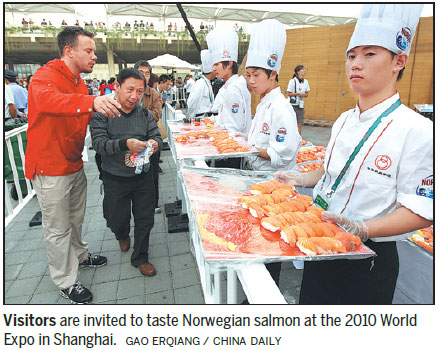Norway seafood sees exciting future in tickling local tastebuds
(China Daily) Updated: 2017-04-10 07:22OSLO - A major investor from the land of the vikings said China would be the next big fish market to be conquered by Norwegian salmon.
"China is too big to ignore," Hogne I. Tyssoy, portfolio manager of the Holberg Triton fund, said in an interview in Oslo. "Now when it's opening again, Norwegian seafood has an exciting future in China."
Norway, the world's biggest Atlantic salmon producer, is seeking to increase seafood exports as the global demand for healthy proteins rises, especially in emerging markets such as China.
Tyssoy will join Norwegian Prime Minister Erna Solberg's delegation to China in April, along with other business executives and investors, as Norway seeks to re-establish contact with the world's most populous country.

While the fund may consider investing in Chinese companies in future, Tyssoy said he was interested in seeing first hand what growth opportunities are in store for Norwegian fish farmers in China.
One such example is Marine Harvest ASA's cooperation with Alibaba Group Holding Ltd, China's biggest e-commerce company, to sell salmon on the internet, a collaboration that could "develop quickly," according to the 55-year-old.
"It's a bit of a revolution when the logistical chain works," he said. "And Norwegian seafood with high quality and popularity can benefit."
The Norwegian industry is looking for new markets and new ways to boost margins. After advancing more than 400 percent over the past five years, the Oslo Seafood Index has slid 16 percent so far this year.
Holberg Triton, an equity fund based in the southern Norwegian city of Bergen, manages about 670 million kroner ($80 million). It invests only in the seafood sector and returned 30 percent since its start two years ago. The fund's largest holdings as of February included Leroy Seafood Group ASA, Sanford Ltd, Austevoll Seafood ASA and Bakkafrost P/F.
"Bakkafrost is in a league of its own with a 30 to 40 percent return on equity," he said. "It's perhaps the best managed salmon producer in the world."
The salmon industry is struggling with health and sustainability issues due to holding large numbers of fish in open-water cages, but long-term trends of growing prosperity and food awareness will continue to support demand growth, according to Tyssoy.
"Seafood is the only area where Norway has succeeded in creating a global retail product on a big scale," he said.
"Norwegian salmon is status."
Bloomberg
- 'Cooperation is complementary'
- Worldwide manhunt nets 50th fugitive
- China-Japan meet seeks cooperation
- Agency ensuring natural gas supply
- Global manhunt sees China catch its 50th fugitive
- Call for 'Red Boat Spirit' a noble goal, official says
- China 'open to world' of foreign talent
- Free trade studies agreed on as Li meets with Canadian PM Trudeau
- Emojis on austerity rules from top anti-graft authority go viral
- Xi: All aboard internet express











